Stack machine
Ask VM to compute 2 + 2
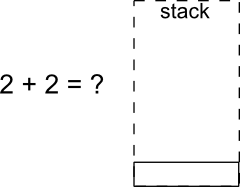
LIFO — Last-In-First-Out
Adamansky Anton
public class Sum {
public static void main(String[] args) {
int a = 2;
int b = 2;
int c = a + b;
}
}
— The set of instructions in order to execute in a registry-based virtual machine.
Ask VM to compute 2 + 2

LIFO — Last-In-First-Out
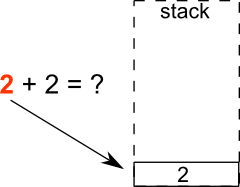
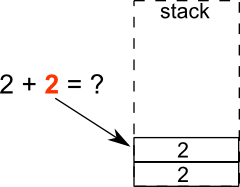
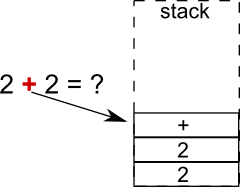
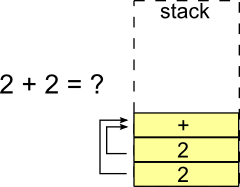
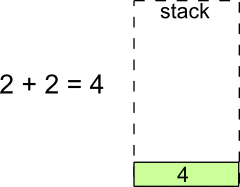

Hmm....

Hmm....
ClassFile {
u4 magic;
u2 minor_version;
u2 major_version;
u2 constant_pool_count;
cp_info constant_pool[constant_pool_count-1];
u2 access_flags;
u2 this_class;
u2 super_class;
u2 interfaces_count;
u2 interfaces[interfaces_count];
u2 fields_count;
field_info fields[fields_count];
u2 methods_count;
method_info methods[methods_count];
u2 attributes_count;
attribute_info attributes[attributes_count];
}
00000000 ca fe ba be 00 00 00 34 00 1d 0a 00 06 00 0f 09 00000010 00 10 00 11 08 00 12 0a 00 13 00 14 07 00 15 07 00000020 00 16 01 00 06 3c 69 6e 69 74 3e 01 00 03 28 29
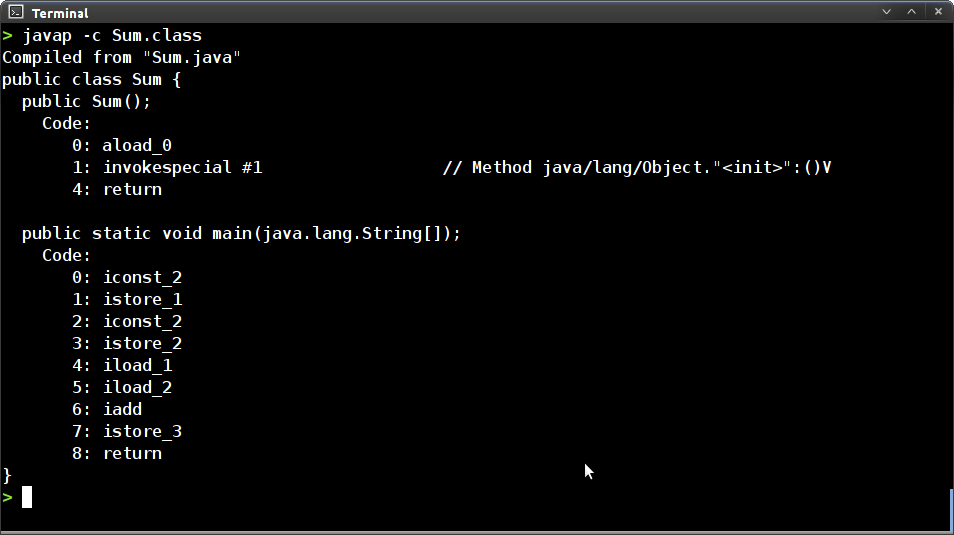
javap -c Sum.class
public Sum(): //Sum constructor
aload_0 //PUSH this on top of the stack
invokespecial #1 //POP this and invoke #1 method on this
Constant pool: #1 = Methodref #3.#12 // java/lang/Object."<init>":()V #2 = Class #13 // Sum #3 = Class #14 // java/lang/Object #4 = Utf8 <init> #5 = Utf8 ()V #6 = Utf8 Code #7 = Utf8 LineNumberTable #8 = Utf8 main #9 = Utf8 ([Ljava/lang/String;)V #10 = Utf8 SourceFile #11 = Utf8 Sum.java #12 = NameAndType #4:#5 // "<init>":()V #13 = Utf8 Sum #14 = Utf8 java/lang/Object
iconst_2 PUSH 2 const
istore_1 POP 2 → local a var with 1 index
iconst_2 PUSH 2 const
istore_2 POP 2 → local b var with 2 index
iload_1 PUSH local a value
iload_2 PUSH local b value
iadd POP a POP b → PUSH a + b
istore_3 POP a + b → save into local c var
return
public static void main(String[] args) {
int a = 2;
int b = 2;
int c = a + b;
}
iload, aload, lload ...
| b | byte |
| s | short |
| c | char |
| i | int |
| l | long |
| f | float |
| d | double |
| a | object ref |
http://docs.oracle.com/javase/specs/jvms/se7/html/jvms-6.html
| Java type | Bytecode descriptor |
|---|---|
| int | I |
| long | J |
| float | F |
| double | D |
| char | C |
| Java type | Bytecode descriptor |
|---|---|
| boolean | Z |
| String | Ljava/lang/String; |
| void | V |
| int[] | [I |
| int[][] | [[I |
| ... | ... |
package foo.bar;
class C {
int m1()
void m2(int i)
String m3(int x, String y)
}
| Method | Bytecode descriptor |
|---|---|
| int m1() | foo/bar/C.m1()I |
| void m2(int i) | foo/bar/C.m2()(I)V |
| foo/bar/C.m2() (ILjava/lang/String;)Ljava/lang/String; | |
| ???? |
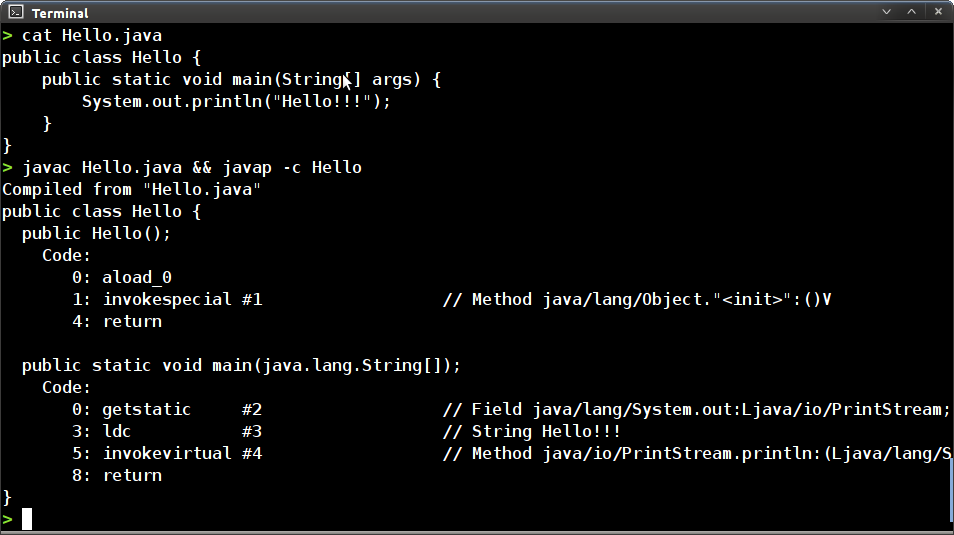
ASM is an all purpose Java bytecode manipulation and analysis framework.
De facto standard bytecode manipulation library.
BiteScript is a Ruby DSL for generating Java bytecode and classes
Program 1:
package nsu.fit.javaperf.lab2;
public class P1 {
public static void main(String[] args) {
String s = "";
for (int i = 0; i < 10000; ++i) {
s += " " + String.valueOf(i);
}
System.out.println(s.length());
}
}
Program 2:
package nsu.fit.javaperf.lab2;
public class P2 {
public static void main(String[] args) {
StringBuilder s = new StringBuilder();
for (int i = 0; i < 10000; ++i) {
s.append(" ").append(String.valueOf(i));
}
System.out.println(s.length());
}
}
package nsu.fit.javaperf.lab3;
public class Lab3 {
int coins = 1;
void muliplyCoins(int ratio) {
int newcoins = coins * ratio;
coins = newcoins;
}
public static void main(String[] args) {
Lab3 l2 = new Lab3();
l2.muliplyCoins(10);
l2.muliplyCoins(20);
}
}
| Octet | Related bytecode instruction |
|---|---|
| 0x3d | istore_2 |
| ... | ... |
public class HelloWorld {
public static void main(String[] args) {
System.out.println("Hello, World!");
}
}
ClassWriter cw = new ClassWriter(ClassWriter.COMPUTE_MAXS | ClassWriter.COMPUTE_FRAMES);
COMPUTE_MAXS tells ASM to automatically compute the maximum stack size and the maximum
number of local variables of methods.
COMPUTE_FRAMES flag makes ASM
to automatically compute the stack map frames of methods from scratch.
cw.visit(Opcodes.V1_7, Opcodes.ACC_PUBLIC, "HelloWorld", null,
"java/lang/Object", null);
MethodVisitor constructor =
cw.visitMethod(Opcodes.ACC_PUBLIC, "<init>", "()V", null, null);
constructor.visitCode();
//call super()
constructor.visitVarInsn(Opcodes.ALOAD, 0);
constructor.visitMethodInsn(Opcodes.INVOKESPECIAL,
"java/lang/Object", "<init>", "()V");
constructor.visitInsn(Opcodes.RETURN);
constructor.visitMaxs(0, constructor.visitEnd(); 0);
MethodVisitor mv = cw.visitMethod(Opcodes.ACC_PUBLIC + Opcodes.ACC_STATIC,
"main", "([Ljava/lang/String;)V", null, null);
mv.visitFieldInsn(Opcodes.GETSTATIC, "java/lang/System",
"out", "Ljava/io/PrintStream;");
mv.visitLdcInsn("Hello, World!");
mv.visitMethodInsn(Opcodes.INVOKEVIRTUAL, "java/io/PrintStream",
"println", "(Ljava/lang/String;)V");
mv.visitInsn(Opcodes.RETURN);
mv.visitMaxs(0, mv.visitEnd(); 0);
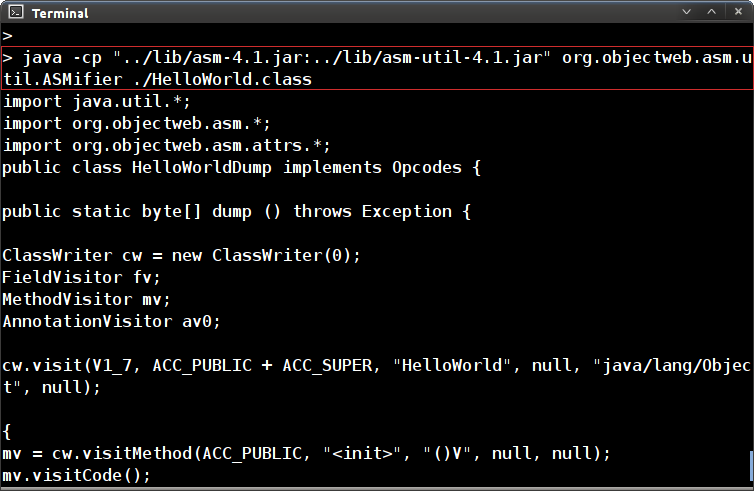
It is a class library for editing bytecodes in Java; it enables Java programs to define a new class at runtime and to modify a class file when the JVM loads it. http://www.csg.ci.i.u-tokyo.ac.jp/~chiba/javassist/
package nsu.fit.javaperf.lab4;
public class Lab4 {
static class Calculator {
public int sum(int x, int y) {
return x + y;
}
}
static Calculator createCalculator() throws Exception {
//todo use JavaAssist to inherit Calculator class,
//overload sum() method
//and add 1 to original return value, so 2 + 2 will be 5
return new Calculator();
}
public static void main(String[] args) throws Exception {
Calculator cal = createCalculator();
System.out.println("2 + 2 = " + cal.sum(2, 2));
}
}
public class Lab5 {
static <T> T setLogging(final T obj) {
//todo get all interfaces: obj.getClass().getInterfaces()
//todo Intercept with java.lang.reflect.Proxy
//todo Log each interface call into System.out
//todo OUTPUT EXAMPLE:
//todo CALLING: java.lang.Runnable#run()
//todo RETURN VAL: null
return (T) obj;
}
...
Allows on-fly bytecode modification of all JVM classes.
Пусть имеет некоторый каталог /A в котором находятся произвольные .class файлы,
необходимо написать программу которая принимает в качестве параметра командной строки
путь до данного каталога, и проверяет каждый класс (находящийся в нем) на наличие метода:
String getSecurityMessage(), если данный метод присутствует в классе, программа
создает объект класса (публичный конструктор без параметров), вызывает данный метод и
выводит на консоль полное имя класса и результат выполнения данного метода. Скачать
каталог с тестовыми классами можно здесь: http://ccfit.nsu.ru/~adamansky/java/task5.zip
package nsu.fit.javaperf;
public class TransactionProcessor {
public void processTransaction(int txNum) throws Exception{
System.err.println("Processing tx: " + txNum);
int sleep = (int) (Math.random() * 1000);
Thread.sleep(sleep);
System.err.println(String.format("tx: %d completed", txNum));
}
public static void main(String[] args) throws Exception{
TransactionProcessor tp = new TransactionProcessor();
int tx = 0;
tp.processTransaction(++tx);
tp.processTransaction(++tx);
tp.processTransaction(++tx);
} }
Using java agent technology and class files transformations ask the following questions:
object class name => size in bytes
nsu.fit.javaperf